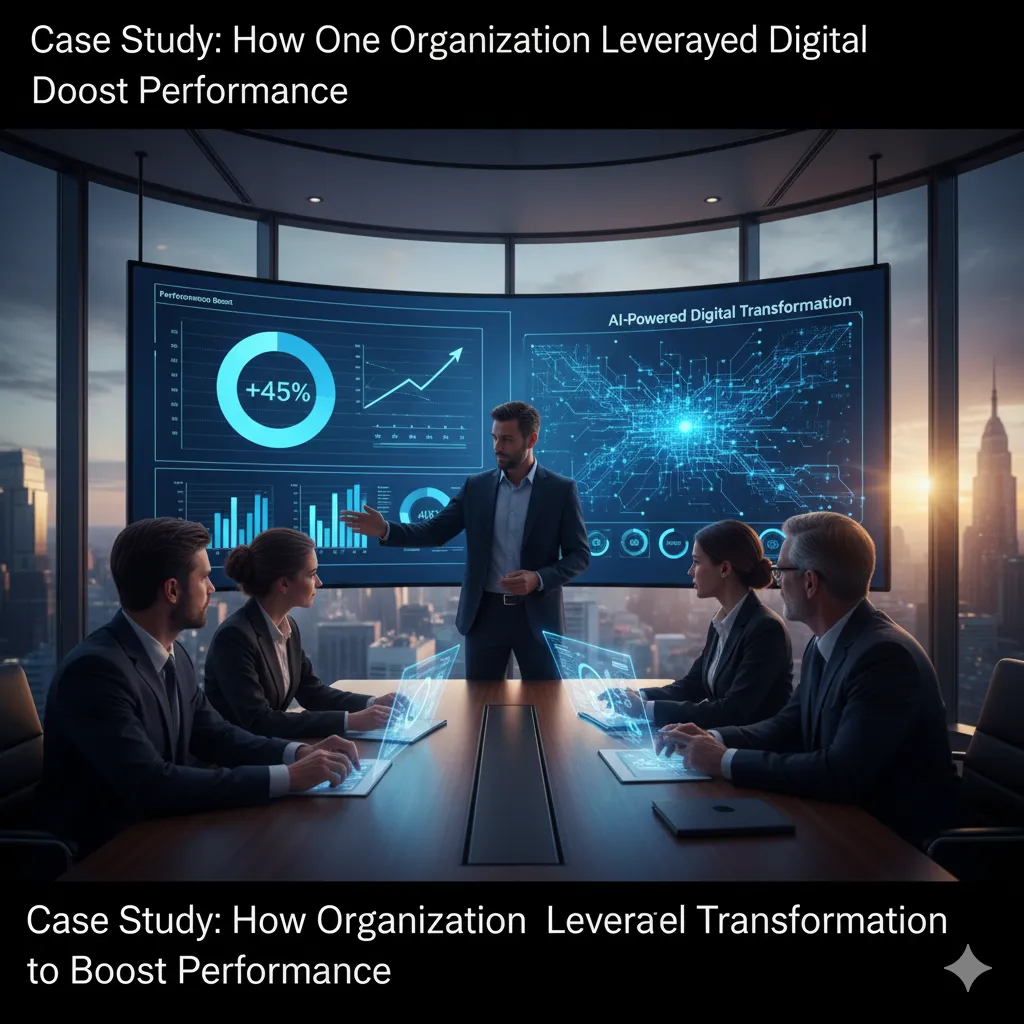
Case Study: How One Organization Leveraged Digital Transformation to Boost PerformanceCase Study: How One Organization Leveraged Digital Transformation to Boost Performance
“It is not the strongest of the species that survives, nor the most intelligent, but the one most responsive to change.” — Charles Darwin
In today’s digital age, success is no longer determined by size or resources—but by adaptability.
This truth rings especially loud for businesses navigating the challenges of the post-pandemic economy, where technology isn’t just an advantage—it’s a necessity.
This case study examines how one organization embraced AI, automation, and CRM systems to transform its operations, improve collaboration, and drive measurable results. The lessons here apply not only to real estate professionals but to any team ready to evolve with the digital era.
The Challenge: Traditional Operations in a Digital World
The organization—let’s call it Prime Realty Group—had a strong client base but relied heavily on manual workflows:
Client lists were maintained in spreadsheets.
Follow-ups were done by memory or scattered reminders.
Reporting relied on end-of-month reconciliations, often leading to missed opportunities.
Despite the team’s skill and dedication, inefficiencies slowed growth. They realized that what made them successful in the past was holding them back from the future.
As discussed in The Growth Mindset Advantage: How Professionals Can Build Habits for Long-Term Success, recognizing when to adapt is the first step toward progress.
The Turning Point: Adopting a Digital Mindset
Prime Realty’s leadership decided to undergo digital transformation—starting small but thinking big.
The process began with:
AI-Powered CRM Adoption to automate follow-ups and track engagement.
Cloud Collaboration Tools for team updates and performance transparency.
Data-Driven Insights to guide decisions based on trends, not guesswork.
Initially, there was skepticism. Some staff feared automation would “replace” their roles. But the leadership framed technology as a partner, not a competitor—a message echoed throughout From Manual to Automated: How AI and CRM Tools Are Transforming Professional Workflows.
Implementation Strategy: One Step at a Time
Digital transformation isn’t about installing tools—it’s about building habits around them. Prime Realty followed a phased approach:
Training and Familiarization
Conducted hands-on workshops to introduce CRM systems and AI features.
(See Essential Professional Skills for 2025: Sales, Leadership, and Digital Fluency for the skills that support this.)Process Automation
Introduced automated reminders, pipeline management, and client segmentation.Analytics Integration
Replaced manual reports with real-time dashboards showing conversion rates, engagement, and ROI.Feedback Loops
Weekly sessions ensured continuous improvement and buy-in from every team member.
The Results: Efficiency, Engagement, and Growth
Within six months of implementation, the company achieved:
40% Increase in Lead Conversion through automated nurturing and consistent communication.
30% Reduction in Response Time thanks to centralized CRM workflows.
Improved Client Retention, as data-driven personalization replaced one-size-fits-all marketing.
Empowered Teams, who could now focus on relationship-building instead of administrative tasks.
This mirrors industry-wide patterns highlighted in PropTech and Beyond: Real Estate Technology Trends Every Professional Should Watch in 2025—where digital integration drives both innovation and profitability.
Lessons Learned
Leadership Commitment Is Key. Digital tools fail without consistent executive support.
Mindset Matters. The growth mindset encouraged openness to new systems and continuous learning.
Small Wins Build Momentum. Success came not from overhauling everything at once, but from automating one process at a time.
Looking Ahead: Continuous Evolution
Prime Realty’s story is not a one-time success—it’s an ongoing transformation. The company now plans to integrate AI chat assistants, enhance client portals, and explore data-driven property recommendations.
These innovations reflect a new norm where professionals must blend human expertise with digital intelligence—a principle we’ll expand on in From Struggle to Strength: Stories of Professionals Thriving Through Digital Transformation.
Final Thoughts
Digital transformation doesn’t happen overnight—it happens through vision, consistency, and courage.
The most successful organizations are not those with the best technology, but those that align technology with purpose.
For professionals in real estate, marketing, or consulting, this case study proves one point:
Change is not your enemy—it’s your competitive edge.
✅ Soft Call-to-Action
Interested in implementing a digital transformation strategy for your business or team? Connect with me for a consultation or hands-on training workshop tailored to your goals.
🔎 Sources
PwC: Digital Transformation and Industry 4.0 Outlook 2025
Deloitte: How Real Estate Companies Are Winning with Technology
McKinsey: The Case for Digital Transformation in Service Businesses
